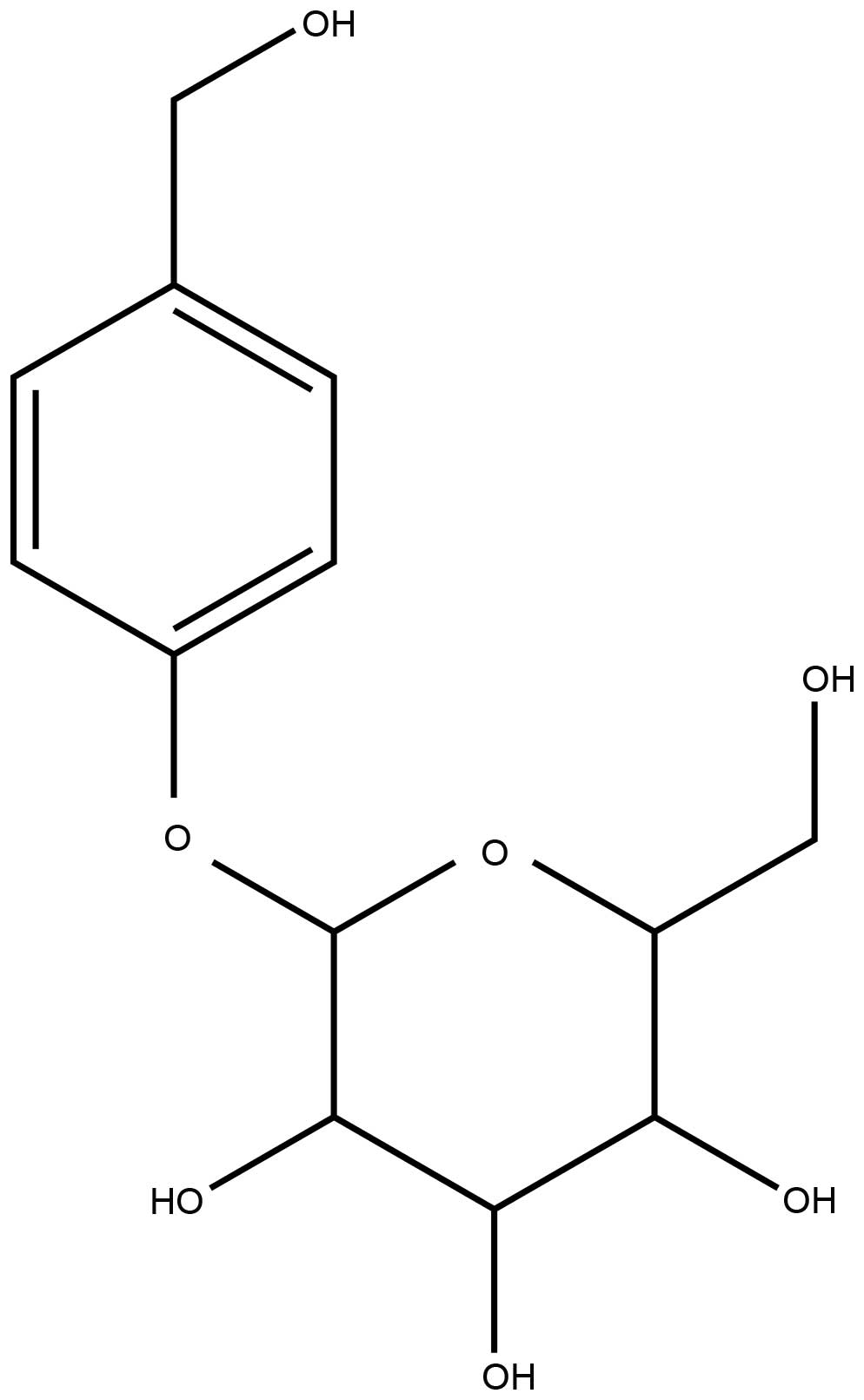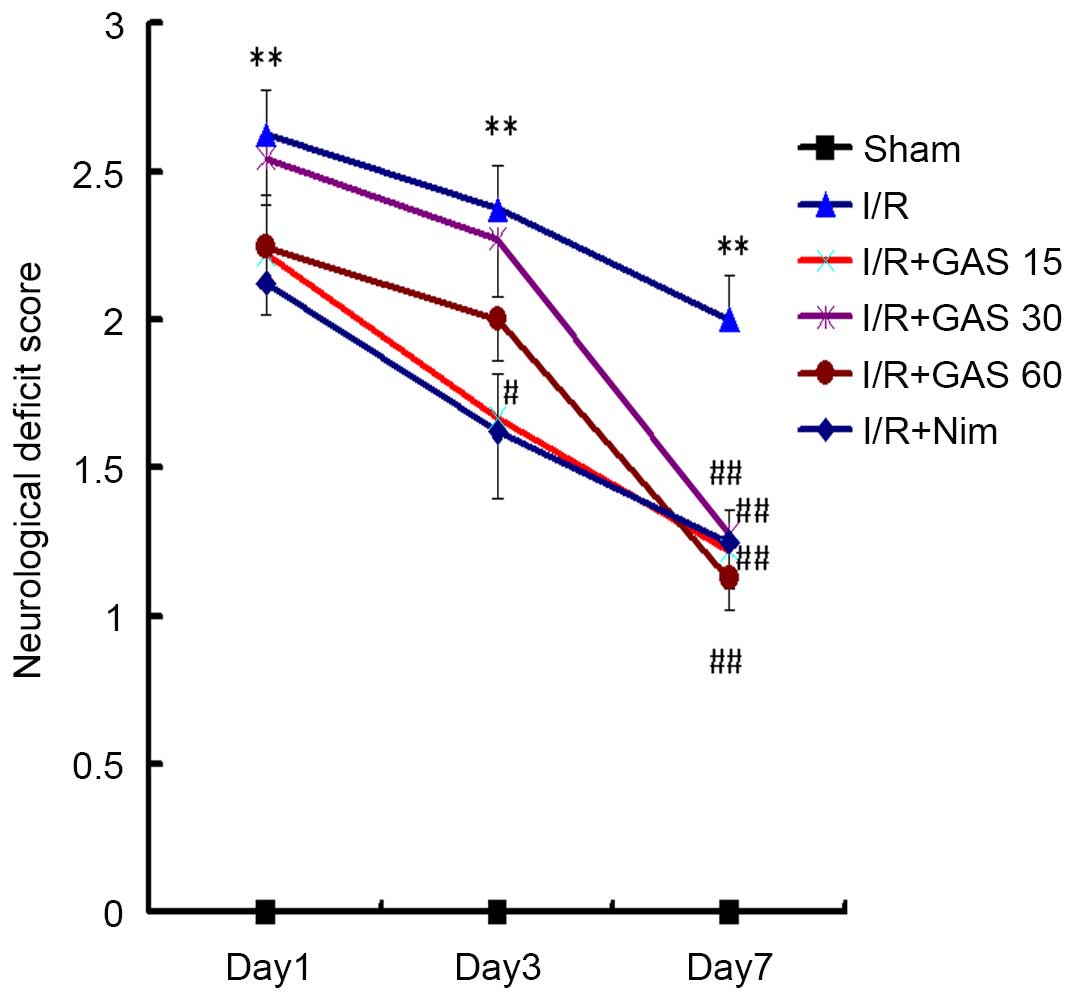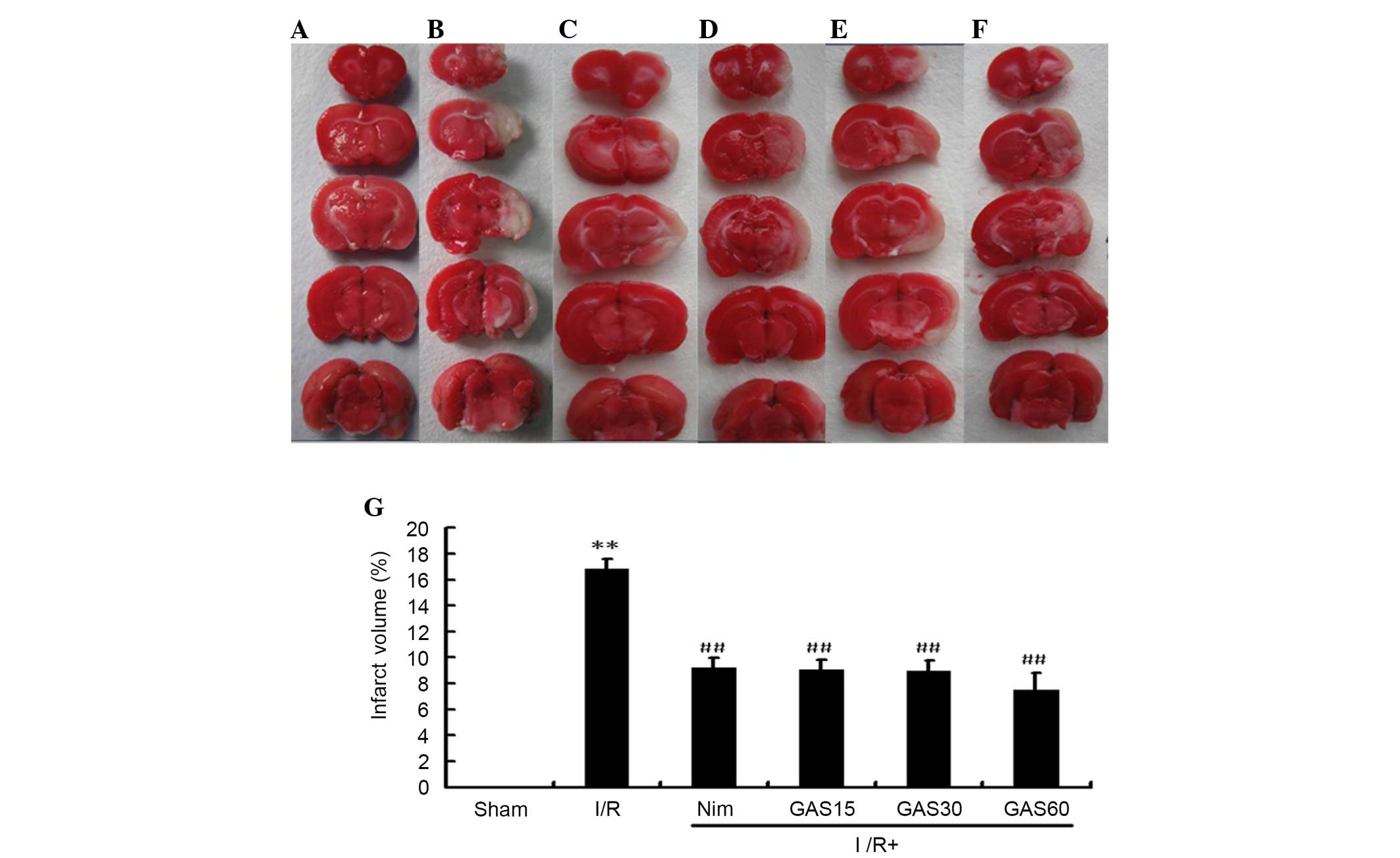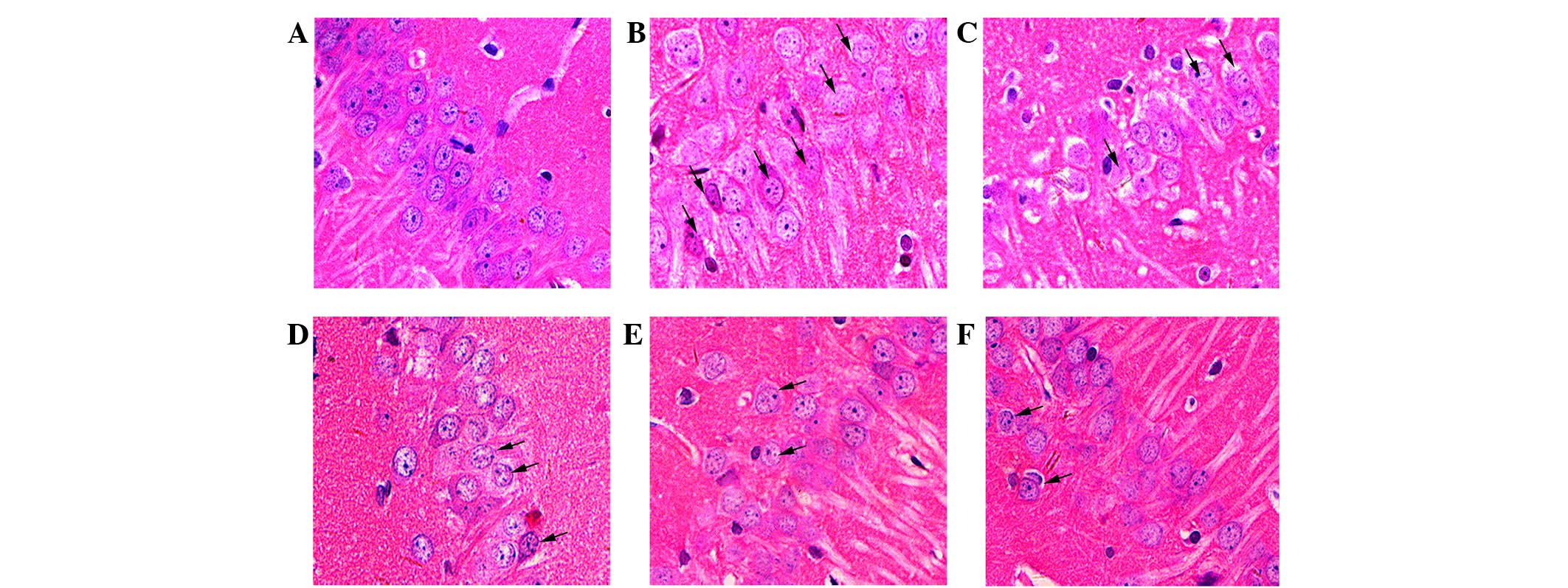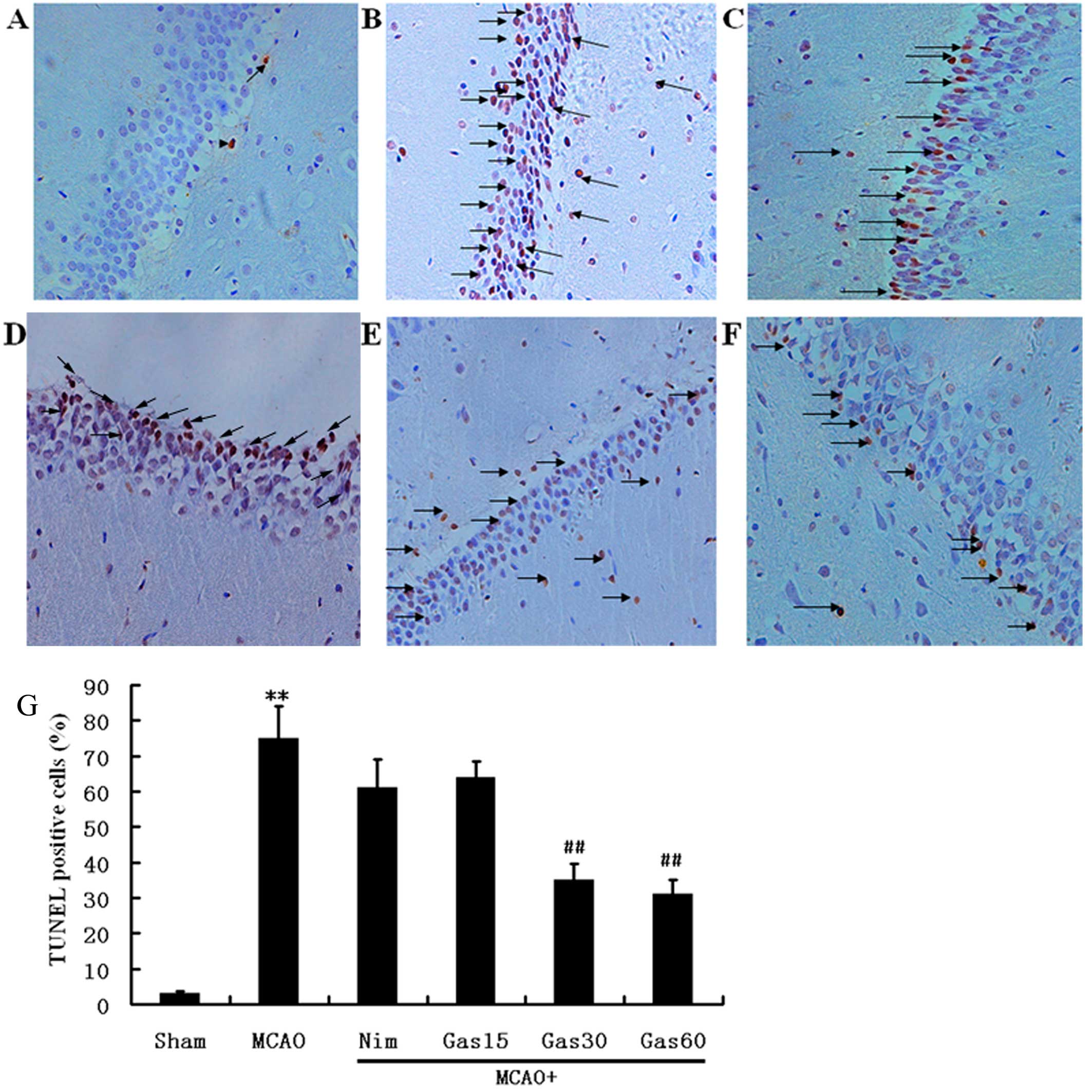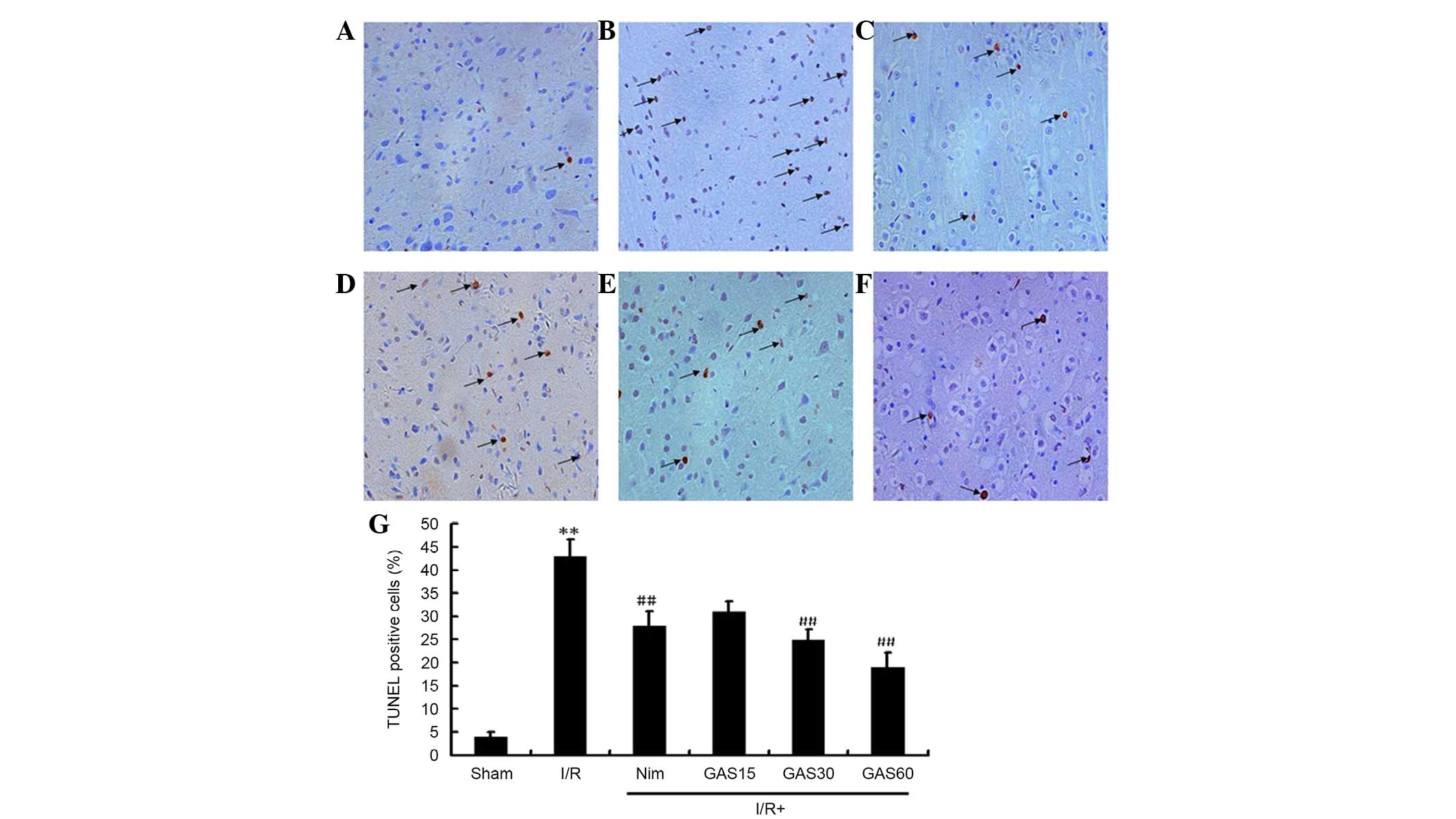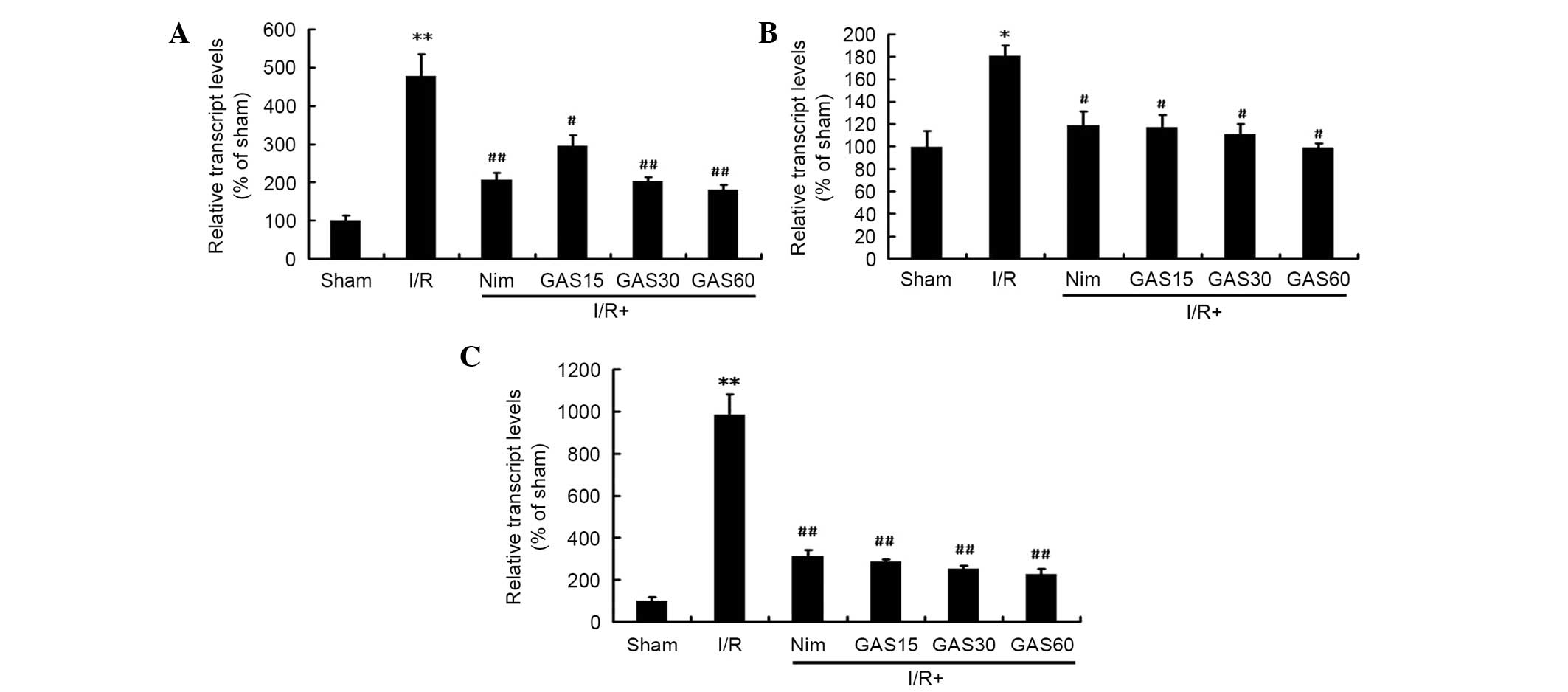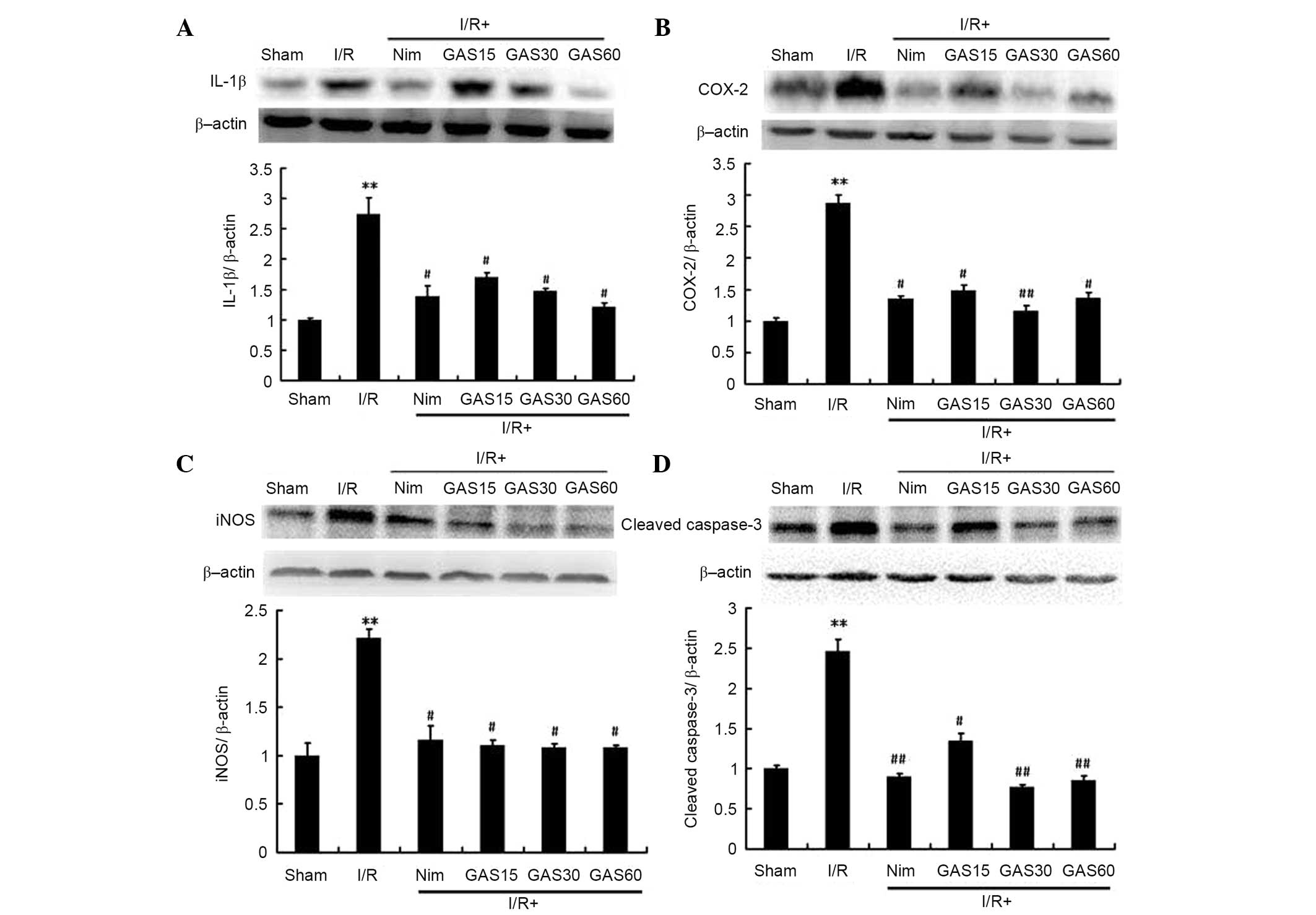|
1
|
Feigin VL, Lawes CM, Bennett DA,
Barker-Collo SL and Parag V: Worldwide stroke incidence and early
case fatality reported in 56 population-based studies: A systematic
review. Lancet Neurol. 8:355–369. 2009. View Article : Google Scholar : PubMed/NCBI
|
|
2
|
Rosamond W, Flegal K, Furie K, Go A,
Greenlund K, Haase N, Hailpern SM, Ho M, Howard V, Kissela B, et
al: Heart disease and stroke statistics-2008 update: A report from
the American heart association statistics committee and stroke
statistics subcommittee. Circulation. 117:e25–e146. 2008.
View Article : Google Scholar : PubMed/NCBI
|
|
3
|
Strosznajder RP, Czubowicz K, Jesko H and
Strosznajder JB: Poly (ADP-ribose) metabolism in brain and its role
in ischemia pathology. Mol Neurobiol. 41:187–196. 2010. View Article : Google Scholar : PubMed/NCBI
|
|
4
|
Gonzalez CL, Gharbawie OA and Kolb B:
Chronic low-dose administration of nicotine facilitates recovery
and synaptic change after focal ischemia in rats.
Neuropharmacology. 50:777–787. 2006. View Article : Google Scholar : PubMed/NCBI
|
|
5
|
Mehta SL, Manhas N and Raghubir R:
Molecular targets in cerebral ischemia for developing novel
therapeutics. Brain Res Rev. 54:34–66. 2007. View Article : Google Scholar : PubMed/NCBI
|
|
6
|
Wu Pf, Zhang Z, Wang F and Chen JG:
Natural compounds from traditional medicinal herbs in the treatment
of cerebral ischemia/reperfusion injury. Acta Pharmacol Sin.
31:1523–1531. 2010. View Article : Google Scholar : PubMed/NCBI
|
|
7
|
Zhu H, Dai P, Zhang W, Chen E, Han W, Chen
C and Cui Y: Enzymic synthesis of gastrodin through microbial
transformation and purification of gastrodin biosynthesis enzyme.
Biol Pharm Bull. 33:1680–1684. 2010. View Article : Google Scholar : PubMed/NCBI
|
|
8
|
Kumar H, Kim IS, More SV, Kim BW, Bahk YY
and Choi DK: Gastrodin protects apoptotic dopaminergic neurons in a
toxin-induced Parkinson's disease model. Evid-Based Compl Alt.
2013:5140952013. View Article : Google Scholar
|
|
9
|
Lin LC, Chen YF, Lee WC, Wu YT and Tsai
TH: Pharmacokinetics of gastrodin and its metabolite
p-hydroxybenzyl alcohol in rat blood, brain and bile by
microdialysis coupled to LC-MS/MS. J Pharm Biomed Anal. 48:909–917.
2008. View Article : Google Scholar : PubMed/NCBI
|
|
10
|
Zeng X, Zhang S, Zhang L, Zhang K and
Zheng X: A study of the neuroprotective effect of the phenolic
glucoside gastrodin during cerebral ischemia in vivo and in vitro.
Planta Med. 72:1359–1365. 2006. View Article : Google Scholar : PubMed/NCBI
|
|
11
|
Xu X, Lu Y and Bie X: Protective effects
of gastrodin on hypoxia-induced toxicity in primary cultures of rat
cortical neurons. Planta Med. 73:650–654. 2007. View Article : Google Scholar : PubMed/NCBI
|
|
12
|
Bie X, Chen Y, Han J, Dai H, Wan H and
Zhao T: Effects of gastrodin on amino acids after cerebral
ischemia-reperfusion injury in rat striatum. Asia Pac J Clin Nutr.
16:305–308. 2007.PubMed/NCBI
|
|
13
|
Dai JN, Zong Y, Zhong LM, Li YM, Zhang W,
Bian LG, Ai QL, Liu YD, Sun J and Lu D: Gastrodin inhibits
expression of inducible NO synthase, cyclooxygenase-2 and
proinflammatory cytokines in cultured LPS-stimulated microglia via
MAPK pathways. PloS One. 6:e218912011. View Article : Google Scholar : PubMed/NCBI
|
|
14
|
Wang Y, Wu Z, Liu X and Fu Q: Gastrodin
ameliorates Parkinson's disease by downregulating connexin 43. Mol
Med Rep. 8:585–590. 2013.PubMed/NCBI
|
|
15
|
Peng Z, Wang H, Zhang R, Chen Y, Xue F,
Nie H, Chen Y, Wu D, Wang Y, Wang H and Tan Q: Gastrodin
ameliorates anxiety-like behaviors and inhibits IL-1beta level and
p38 MAPK phosphorylation of hippocampus in the rat model of
posttraumatic stress disorder. Physiol Res. 62:537–545.
2013.PubMed/NCBI
|
|
16
|
Bederson JB, Pitts LH, Tsuji M, Nishimura
MC, Davis RL and Bartkowski H: Rat middle cerebral artery
occlusion: Evaluation of the model and development of a neurologic
examination. Stroke. 17:472–476. 1986. View Article : Google Scholar : PubMed/NCBI
|
|
17
|
Livak KJ and Schmittgen TD: Analysis of
relative gene expression data using real-time quantitative PCR and
the 2(−Delta Delta C(T)) Method. Methods. 25:402–408. 2001.
View Article : Google Scholar : PubMed/NCBI
|
|
18
|
Hoffman GE, Merchenthaler I and Zup SL:
Neuroprotection by ovarian hormones in animal models of
neurological disease. Endocrine. 29:217–231. 2006. View Article : Google Scholar : PubMed/NCBI
|
|
19
|
Boyko M, Zlotnik A, Gruenbaum BF,
Gruenbaum SE, Ohayon S, Goldsmith T, Kotz R, Leibowitz A, Sheiner
E, Shapira Y and Teichberg VI: An experimental model of focal
ischemia using an internal carotid artery approach. J Neurosci
Methods. 193:246–253. 2010. View Article : Google Scholar : PubMed/NCBI
|
|
20
|
Kakarieka A, Schakel E and Fritze J:
Clinical experiences with nimodipine in cerebral ischemia. J Neural
Trans Suppl. 43:13–21. 1994.
|
|
21
|
Aslan A, Gurelik M, Cemek M, Goksel HM and
Buyukokuroglu ME: Nimodipine can improve cerebral metabolism and
outcome in patients with severe head trauma. Pharmacol Res.
59:120–124. 2009. View Article : Google Scholar : PubMed/NCBI
|
|
22
|
Fogelholm R, Erilä T, Palomäki H, Murros K
and Kaste M: Effect of nimodipine on final infarct volume after
acute ischemic stroke. Cerebrovasc Dis. 10:189–193. 2000.
View Article : Google Scholar : PubMed/NCBI
|
|
23
|
Babu CS and Ramanathan M: Post-ischemic
administration of nimodipine following focal cerebral
ischemic-reperfusion injury in rats alleviated excitotoxicity,
neurobehavioural alterations and partially the bioenergetics. Int J
Dev Neurosci. 29:93–105. 2011. View Article : Google Scholar : PubMed/NCBI
|
|
24
|
Muir KW, Tyrrell P, Sattar N and Warburton
E: Inflammation and ischaemic stroke. Curr Opin Neurol. 20:334–342.
2007. View Article : Google Scholar : PubMed/NCBI
|
|
25
|
Ye YL, Shi WZ, Zhang WP, Wang ML, Zhou Y,
Fang SH, Liu LY, Zhang Q, Yu YP and Wei EQ: Cilostazol, a
phosphodiesterase 3 inhibitor, protects mice against acute and late
ischemic brain injuries. Eur J Pharmacol. 557:23–31. 2007.
View Article : Google Scholar : PubMed/NCBI
|
|
26
|
Simard JM, Kent TA, Chen M, Tarasov KV and
Gerzanich V: Brain oedema in focal ischaemia: Molecular
pathophysiology and theoretical implications. Lancet Neurol.
6:258–268. 2007. View Article : Google Scholar : PubMed/NCBI
|
|
27
|
Jin R, Yang G and Li G: Inflammatory
mechanisms in ischemic stroke: Role of inflammatory cells. J Leukoc
Biol. 87:779–789. 2010. View Article : Google Scholar : PubMed/NCBI
|
|
28
|
Li F, Gong Q, Wang L and Shi J: Osthole
attenuates focal inflammatory reaction following permanent middle
cerebral artery occlusion in rats. Biol Pharm Bull. 35:1686–1690.
2012. View Article : Google Scholar : PubMed/NCBI
|
|
29
|
Maddahi A and Edvinsson L: Cerebral
ischemia induces microvascular pro-inflammatory cytokine expression
via the MEK/ERK pathway. J Neuroinflammation. 7:142010. View Article : Google Scholar : PubMed/NCBI
|
|
30
|
Jiang MH, Kaku T, Hada J and Hayashi Y:
7-Nitroindazole reduces nitric oxide concentration in rat
hippocampus after transient forebrain ischemia. Eur J Pharmacol.
380:117–121. 1999. View Article : Google Scholar : PubMed/NCBI
|
|
31
|
Iadecola C, Forster C, Nogawa S, Clark HB
and Ross ME: Cyclooxygenase-2 immunoreactivity in the human brain
following cerebral ischemia. Acta Neuropathol. 98:9–14. 1999.
View Article : Google Scholar : PubMed/NCBI
|
|
32
|
Lujia Y, Xin L, Shiquan W, Yu C, Shuzhuo Z
and Hong Z: Ceftriaxone pretreatment protects rats against cerebral
ischemic injury by attenuating microglial activation-induced IL-1β
expression. Int J Neurosci. 124:657–665. 2014. View Article : Google Scholar : PubMed/NCBI
|
|
33
|
Hartmann A, Hunot S, Michel PP, Muriel MP,
Vyas S, Faucheux BA, Mouatt-Prigent A, Turmel H, Srinivasan A,
Ruberg M, et al: Caspase-3: A vulnerability factor and final
effector in apoptotic death of dopaminergic neurons in Parkinson's
disease. P Natl Acad Sci USA. 97:2875–2880. 2000. View Article : Google Scholar
|
|
34
|
Chen J, Nagayama T, Jin K, Stetler RA, Zhu
RL, Graham SH and Simon RP: Induction of caspase-3-like protease
may mediate delayed neuronal death in the hippocampus after
transient cerebral ischemia. J Neurosci. 18:4914–4928.
1998.PubMed/NCBI
|















